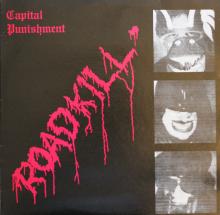Capital Punishment: It's not a (Stiller) Surprise
The music? Well, it’s not punk, but folks are most likely apt to refer to Capital Punishment and its one recording, Roadkill, as post punk in so much that (a) it was recorded after 1977 and (b) it’s pretty bizarre even if it’s not a comedy album. So detached from musical norms – although the then concurrent No Wave thing wasn’t too distant a relative – was Capital Punishment that “Hot Crossed Buns” serves as the basis to a huge portion of the title track’s melody. Again, it’s not a comedy album, though.
There is a healthful dose of synthesizer smattered all over the place, but that one instrument can’t work to define the general aural bent Roadkill was aiming for. And actually, there might not have been any such thing as a concerted style here. “All Just in Passing” sounds like it might have been fodder for a John Hughes soundtrack, it’s all lilting guitar melody and slowly paced rhythms. Granted, there’s an attempt at guitar trickery at some point, but it’s still a pretty staid affair.
In contrast, “Confusion” is synth heavy – it whines and groans out a pulse alongside some willfully gothy vocals and wah-wahed guitar. Hearing the composition so much later, it’s difficult not to envision Stiller and his cohort wearing all black, daloppping some eye-liner on and walking around New York confusing the bejesus of the slightly aging punkers from a few years earlier. What’s surprising here is that the guitar works pretty well and the entire song kinda just falls into place with Stiller’s drumming being adequate if not great.
For all the reissues nonsense having occurred over the last few years, it’s a bit shocking that Capital Punishment hasn’t been afforded a renaissance of its own. Though a bit uneven, the entertaining bits coupled with Stiller’s high profile should probably have helped this thing’s dissemination.
Thee Midnighters - "I Found a Peanut" (Video)
Apart from this song being endlessly entertaining, its lyrics sound like the impetus for the Cramps' "Don't Eat Stuff Off The Sidewalk." Even if it's not, the song found inclusion as a cover on Kid Congo's last long player on In the Red Records. Boss sounds - original and retold...
Marginal Man: Chocolate Pudding and DC Hardcore
Lesser bands certainly got a shot at having a record recorded and properly distributed in the underground than if located in other cities. And since Dischord’s gone on to work with more fey indie styled groups in latter years, its early catalog still receives a fair amount of attention. Of course, if Minor Threat didn’t rule and MacKaye hadn’t dedicated his life to music, this conversation wouldn’t be worth having. Anyway…
Marginal Man doesn’t stink, but if the band were centered in Bloomington, its story would most likely be drastically different. Either way, most of the players in that group first came together in an ensemble called Artificial Peace, which issued a split single with Exiled back in 1982. A few years on, though, Marginal Man issued its Identity album, which has been bootlegged and reissued to no end. There’s a general consensus that the band’s following Double Image is the better record of the two, but each sports at least a few memorable moments. That being said, there’s still some overlap with “Marginal Man” appearing on each. But considering the song’s some damn catchy, there’s no point in griping about it.
Regardless of which album one prefers, Marginal Man unquestionably showcases the D.C. scene’s slow shift from a focus on speed to what would eventually wind up being pop punk. And getting an earful of just about anything with Marginal Man name on it should make listeners summon images of the nascent East Bay scene which eventually sprouted Lookout! Records and its cohort.
Setting Marginal Man apart from anyone – before or after the band existed – is it’s odd, and assumed accidental, structuring of songs. “Mainstream” and a few other offerings begin with at least a minute’s worth of music before vocals kick in. And on this track specifically, which only clocks in at about three minutes, there’re only two verses and no chorus. That’s odd no matter what kind of music you’re used to hearing. Thing is, though, the song’s arrangement only serves to make the whole thing more interesting.
There’s not really a dour moment in Marginal Man’s catalog. Unfortunately, though, there’s also not too big a catalog.
X: Not Exene, Australian...
Yeah, the Saints rule. Radio Birdman’s surpassed by few bands dating to punk’s early era. But there’s so much other junk floating around down there. Only problem is – or was at least – was that there wasn’t a good way to expose weird bands to an international audience. X, not the Los Angeles band dummy, released its first long player in 1979, but didn’t have it issued in the States until 1993. So, say what you will about Amphetamine Reptile and its host of like minded bands, the label released this stunner. Who even cares that it was fourteen years too late.
Aspirations, was apparently, put together after X lost its lead guitarist, in his sleep no less, and needed to reign it all in. Apart from the fact that there’s not really a bummer in the pack here, the album was recorded in something like five hours. How’s that for keeping costs low?
Either way, in its new formation, the band basically fell under the auspices of Ian Rilen, the band’s bassist and gravelly voiced singer. Contrasted with groups like the Sick Things, X might be a bit tame. But there’s a healthful dose of destructive attitudes running through the whole album.
Aping something of a more simplistic Subhumans’ stance – the UK version, that is – “Police” ratchets up the politics and vaguely references the Clash in Rilen’s reductive reggae styled bass line. Is the track on par with those better known British stalwarts? Probably not, but there’s not too much work out there matching either of those ensemble’s vitriol. X gets close, though.
A bit further on in Aspirations’ run time, it becomes clear that while X was solidly aligned with the punk scene, most of its compositions spurned any conception of the genre as straight ahead, firestorm chording. Granted, the album’s closer, “Batman” takes on that approach, but the remainder of the disc is far more rhythmically inclined than most other groups from the era.
“Good On Ya Baby” is as much bass as it is melody. But with Rilen’s caterwauling, it becomes a bit difficult to even notice. The persistent bottom end comprising each of these songs sets the band apart from its cohort while still allowing X to remain a tremendous discovery for punkers.
Ugly Ducklings: A Canadian (Garage) Dichotomy
What folks frequently forget is that Canada’s initial population wasn’t too different that the States. Perhaps there were a few more Frenchy trappers up there than down here, but a similar exploratory lust served to open up that country up there. What the spirit didn’t translate to in Canada was a revelatory crop of musicians. But while there’s not a Canadian rivaling the changes Terry Riley or the Ramones levied on music, more than a few decent garage acts cropped up during the sixties.
The Ugly Ducklings, which is currently the name of a West Coast rap collective as well, were a shifty group of Stones fans, initially calling their combo the Strolling Bones. Kinda funny, but not impatfull. And while the Ugly Ducklings isn’t the best name ever, tracks like “Windy City” should have made the ensemble better known Stateside then they were.
Beginning with a spate of worked up production noises aiming to approximate a blustery storm, drums kick in with an updated Beat style. Jittery guitar functions as the song’s bedrock as a harmonica replaces the need for any vocal intervention. As the rave up continues, the band’s guitarist gets a feature as tied to the emergent acid scene in the States as anything else the Ugly Ducklings were then working with. Granted, the track doesn’t really go anywhere and by the time it was recorded, there was more than enough of this kinda fair kicking around. But the instrumental still sticks out of the band’s collected works as an interesting take on the genre.
Best known for their song “Nothin’,” the track’s probably more notable for its lyrical content than the music – even as that rolling bass doesn’t have too many peers dating to the early psych and garage era. Either way, the song details being scorned by a woman and the realization that there’s really no need for traditional companionship – or anything else. After all, the guy, apparently, has a Cadillac. And if you’ve got a Cadillac, everything else should fall into place, right?
Well, that’s wishful thinking, but sometimes that’s all that’s left.
Jeffrey`s Blues: A Jeffrey Lee Pierce Documentary (Video)
The Gun Club ruled. And while Jeffrey's work during the eighties couldn't match his earlier output, he's still an interesting (and doomed) figure. Never mind some of the commentary here being something other than English...just watch.
Kleenex - "Nice" (Video)
That's a nasty sounding rhythm section for a band that looks like Kleenex does. But cobbled together from the likes of other top ranking grrl/rawk groups from the seventies, nothing resulting from the collaboration should be surprising. It's just good.
Idle Times: If the Strokes Were Poor
But if that’s the Strokes’ only crime, we should let it go. Is This It? still ranks as an early millennium highlight. And anyone disagreeing with that should probably just go fiddle with their three hundred dollar copy of some live Steve Albini record – aka eat it.
All of this, though, has only been brought up because Hozac’s Idle Times really just sound like the common man’s Strokes. Surely, the band and its label are set to decry such comparisons, after all what’s less cool in the garage/punk underground than being compared to major label retreads? Nothing, I think, is the answer.
Either way, last year’s self title effort from Idle Times is a decent first, long playing effort. The songwriting isn’t consistent from beginning to end, there’re some missed opportunities and persistence of vision might rightly be confused with lack of ideas.
That being said, by the time listeners make it through to the third track, “Gin & Death” there’s at least a break in the mediocrity. A slower pace suits the bands non-caring delivery. And the gnarled guitar chords sitting behind everything work to good effect even if nothing here – or anything after – is able to dethrone the opening “Working on Something.”
At four minutes, the track might initially appear to be a bit too long for Idle Times to work on properly. Somehow, though, the band comes up with a melody strong enough – and its accompanying chorus – to keep listener’s interests. It’s here the band sounds most like the Strokes. But it’s also the only end to end thrilling track on the album (making its inclusion on some year-end top ten lists confusing.)
“Hey Little Girl,” aping a bit of Strokes styled apathy, begins well enough, but finds itself mired in the faux experiments coming about halfway through the track. This right here might be the reason for this new crop of garage stuff falling on its face. Alongside this latest swell in the genre, noise has become a staple in the underground. And combining the two may well prove interesting, but as Idle Times displays here, it’s not always gonna work. And neither does this disc…I’m reaching for the delete key as we speak. I just hope the songwriting gets a once over and these folks give it another go.
Jolt: Scottish Punk and Pop
Jolt aren’t well known beyond folks who were around either in Glasgow during 1976 or London during the latter portion of the decade. There’re probably myriad reasons for that – one being, the band broke up before the mod thing had chance to blossom into a huge market, even if for just a few years. Dogged by comparisons to the Jam, Jolt didn’t really get a fair shake at things being too poppy for punk and too punky – even with matching suits – for the mod crowd.
Either way, the group was able to issue a few fine sides even as Jolt’s lone, proper long player wasn’t the most engaging slab of music released in 1978. Issued through Polydor, also the Jam’s imprint, the self titled effort didn’t surpass chart positions previously held by Jolt’s singles. In fact, nothing was every really hugely popular despite a rather decent stage show.
A handful of efforts from the long player are, though, rife with cut rate RnB rave ups. Efforts like “Decoyed,” though, are thoroughly entertaining as the track sits a bit closer to the punk side of things even as it sports something of a guitar solo. But in hearing this specific track, it’s hard to figure why a few more stabs at the formula didn’t end in something like success.
Usually cited as one of the group’s better efforts “See Saw,” released as a part of Jolt’s second single, doesn’t even live up to the aforementioned “Decoyed” even as it sprung from Paul Weller’s pen.
Even with the endorsement of such luminaries, Jolt just packed it up and threw it away, being relegated to a reissue almost thirty years after first recording. It coulda been worse, but it coulda been better.





